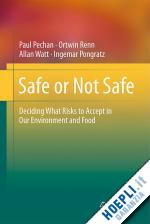

Questo prodotto usufruisce delle SPEDIZIONI GRATIS
selezionando l'opzione Corriere Veloce in fase di ordine.
Pagabile anche con Carta della cultura giovani e del merito, 18App Bonus Cultura e Carta del Docente
Based on an EU workshop at the end of 2005, the book discusses risk and our food supply. The introductory chapter will discuss all aspects of risk and how it applies to food, from risk classification to risk management. Following a discussion of risk, the authors will present three different case studies that will emphasize the following issues:
• What do we want as individuals, as a society
• What is the political context of the risk discussion
• When do we act and what are the costs of not acting/acting
• International trade and legal issues
• Moral dimensions of decision making
• How do we deal with the disproportionate "power" of the various stakeholders
• Rationality/emotive aspects of argumentation (connection between perception /live experiences, knowledge)
• What are facts- and do they change with time
• Psychological aspects: rapture of trust; the need for certainty; connection between danger, fear and risk
1. Risks.- 2. Biodiversity at Risk.- 3. Chemical Contaminants in Food.- 4. The Food Choices We Make.
Paul Pechan is a researcher at the Department of Communication and Media Research, Ludwig Maximilians University Munich. His background is in molecular biology but since 2000 he has been involved in the research and communication of science to the public and youth. His latest work includes scientific papers on information recall, texts for 5 health films and a UNESCO manual for teachers.
Allan Watt is a research scientist at the Centre for Ecology and Hydrology, Edinburgh. He has led several international projects with a focus on conflicts between human activities and biodiversity.
Ingemar Pongratz is group leader and holds an Assistant Professorship at the Department for Biosciences and Nutrition at KI. Dr Pongratz’s main research area is the biology and function of pHLH-PAS proteins and he leads his own research group studying the effects of dioxin exposure at the cellular level.
Ortwin Renn serves as full professor and Chair of Environmental Sociology and Technology Assessment at Stuttgart University (Germany). He directs the Interdisciplinary Research Unit for Risk Governance and Sustainable Technology Development (ZIRN) at Stuttgart University and the non-profit company DIALOGIK, a research institute for the investigation of communication and participation processes in environmental policy making.











Il sito utilizza cookie ed altri strumenti di tracciamento che raccolgono informazioni dal dispositivo dell’utente. Oltre ai cookie tecnici ed analitici aggregati, strettamente necessari per il funzionamento di questo sito web, previo consenso dell’utente possono essere installati cookie di profilazione e marketing e cookie dei social media. Cliccando su “Accetto tutti i cookie” saranno attivate tutte le categorie di cookie. Per accettare solo deterninate categorie di cookie, cliccare invece su “Impostazioni cookie”. Chiudendo il banner o continuando a navigare saranno installati solo cookie tecnici. Per maggiori dettagli, consultare la Cookie Policy.